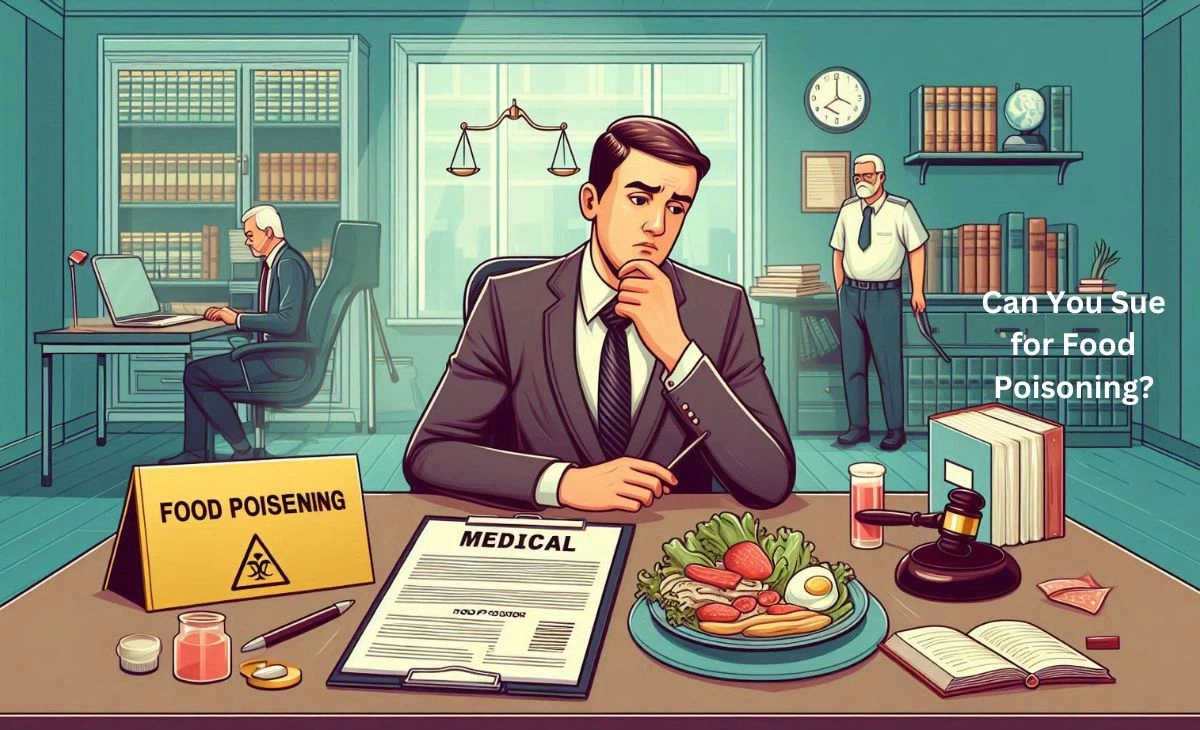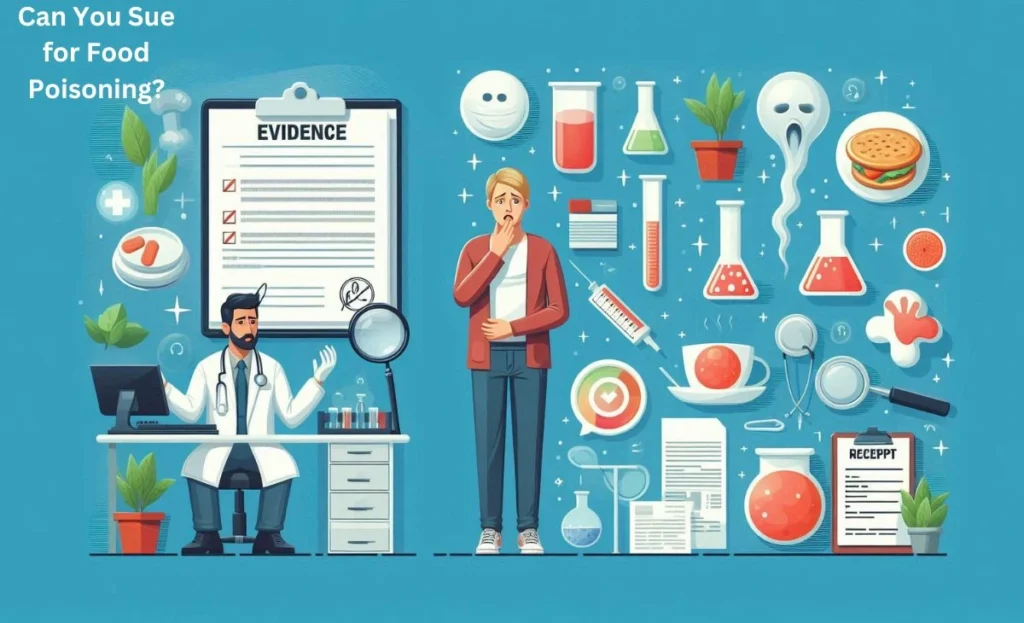
Newsletter Subscribe
Enter your email address below and subscribe to our newsletter

Enter your email address below and subscribe to our newsletter

Imagine you’re out with friends, enjoying a meal at your favorite restaurant. Everything seems perfect—the food looks tasty, the service is great, and you’re having a good time. But a few hours later, something goes wrong. You feel cramps in your stomach, you start feeling nauseous, and you might even start vomiting. You’ve got food poisoning, and it’s not fun at all.
Food poisoning isn’t just a small inconvenience—it can be a serious health problem. According to the CDC, around 48 million people in the U.S. get sick from foodborne illnesses each year. That’s about 1 in every 6 people! The most common causes are bacteria like Salmonella, E. coli, and Listeria. Bacteria, viruses, and parasites can contaminate food. This often happens with improper preparation or contamination. Food poisoning can be mild, but it may also be severe or life-threatening. This is especially true for children, the elderly, and those with weak immune systems.
If you’ve been affected by food poisoning, you may wonder—can you do anything about it? The answer is yes.If someone else’s carelessness, like a restaurant or food maker, caused your illness, you may be able to sue them for your suffering.
This article will explain how to sue for food poisoning. It will cover who is liable and what evidence you’ll need.
Food poisoning occurs from eating or drinking contaminated items. These items may have harmful bacteria, viruses, parasites, or toxins. However, not every post-meal stomachache is food poisoning. It specifically involves dangerous pathogens like Salmonella or E. coli. Additionally, the symptoms must be severe enough to disrupt daily life.
Contamination can happen at any point from where the food is grown to when it is served at your table. Food poisoning usually occurs due to unsafe practices. This can be from improper food handling, undercooked meats, or cross-contamination. When safety standards are ignored, germs can spread, and people can get sick.
Symptoms of food poisoning can appear a few hours to several days after eating contaminated food.. Some of the most common symptoms are:
The severity of symptoms varies by the type of bacteria or virus and the person’s health. Some cases are mild and improve quickly. Others can lead to serious issues like dehydration or kidney failure, especially with E. coli. Young children, the elderly, and pregnant women are at higher risk for severe symptoms.
When food poisoning happens, you might wonder who is to blame. Legally, anyone involved in preparing or handling food is responsible for making sure it’s safe to eat. This includes restaurants, grocery stores, food manufacturers, and even food delivery companies. They all have to follow strict food safety regulations. These rules require businesses to keep their kitchens clean. They must cook food properly and store it at the right temperatures to avoid contamination.
If they don’t follow these safety rules and you get sick, they may be held legally responsible. TFood businesses have a “duty of care” to protect customers. If they fail and someone gets sick, they can face legal actione.
Yes, you can sue for food poisoning if you can prove that someone else’s negligence caused your illness. You can make three legal claims in a food poisoning lawsuit: negligence, breach of warranty, and strict liability.
Negligence: This happens when a business fails to meet the expected standards of care. For example, if a restaurant doesn’t cook meat properly and you get sick, that’s negligence. In a lawsuit, you must prove that the restaurant’s carelessness directly caused your illness.
Breach of Warranty: When you buy food, there’s an implied warranty, or promise, that the food is safe to eat. If you buy food from a store and it makes you sick, you could claim breach of warranty. For example, if you get food poisoning from a pre-packaged salad, the store or manufacturer could be held responsible.
Strict Liability: This means a business can be blamed for your illness even without negligence. In strict liability cases, you don’t have to prove wrongdoing. Simply showing that contaminated food made you sick is enough.

Suing for food poisoning isn’t always easy. You must prove that the food you ate was contaminated. It caused your illness. This is how to win your case. Here’s what you need:
Proof of Contamination: You need solid evidence that the food you ate was tainted with harmful bacteria or viruses. This can come from lab results showing the contamination or from health department records. Expert testimony can also help show that the food was contaminated.
Proof the Food Made You Sick: It’s not enough to say you ate food and got sick afterward. You must prove that the contaminated food caused your illness. This often requires medical records that confirm your diagnosis of food poisoning.
Proof of Responsibility: Lastly, you must prove the business that prepared, served, or sold the food is at fault. This could include showing bad food handling, health code violations, or negligence.
Several different parties can be held responsible in a food poisoning case:
Restaurants: After getting food poisoning from a restaurant, it’s often the first place to check. Restaurants must ensure their food is safe by law. If they don’t, for example, by serving undercooked food or using contaminated ingredients, they can be sued.
Food Suppliers: If the contamination happened before the food reached the restaurant, the supplier can also be held liable. This includes anyone who provided the ingredients to the restaurant.
Food Manufacturers: If you get food poisoning from a product you bought at the store, you can sue the manufacturer. Manufacturers are responsible for ensuring their products are safe for consumption. If their products are contaminated, they can be held legally responsible.
Grocery Stores: Grocery stores can be held liable for selling contaminated or spoiled food. If a store fails to remove unsafe items or store food properly, it can be sued for resulting illnesses.
If you suspect food poisoning, take steps to protect your health and legal rights:
Seek Medical Treatment: The most important thing to do is get medical help right away. Even if your symptoms seem mild, food poisoning can become serious very quickly. By going to a doctor, you’ll also have medical records to support your claim if you decide to sue.
Report the Incident: After getting medical care, report the incident to your local health department. They may investigate the restaurant or store to see if others have gotten sick as well. The health department’s findings can help your case.
Document Everything: Keep a record of what you ate, when you got sick, and how long your symptoms lasted.. Save any receipts or food packaging as evidence.
Talk to a Lawyer: If you think you have a strong case, contact a lawyer who specializes in food poisoning cases. They can help you understand your legal options and guide you through the process of filing a lawsuit. You can contact the law firm here.
Suing for food poisoning can be worth the effort if you suffered serious harm. However, not every case will result in a big settlement or win. The success of your case depends on the severity of your illness, the evidence you can gather, and whether the business can be proven to be at fault.
In some cases, businesses may settle out of court to avoid negative publicity. But, it may be hard to prove the food caused your illness. This is especially true if there’s no leftover food to test. It’s also true if multiple people didn’t get sick.
While pursuing legal action for food poisoning presents challenges, it remains a viable option for those who have suffered significant harm. Understanding one’s legal rights and the complexities involved in such litigation is crucial. Consultation with an experienced attorney specializing in food safety law can provide valuable guidance on the viability of a case and the potential for recovery. Moreover, such lawsuits serve a broader societal purpose — holding food providers accountable and incentivizing stringent safety protocols to prevent future incidents.
In the landscape of personal injury law, food poisoning cases occupy a unique niche, demanding specialized knowledge and strategic litigation approaches. For victims of serious foodborne illness, the path to justice, though complex, remains navigable with proper legal guidance and documentation.